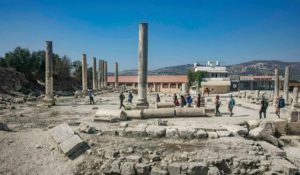Israel launches excavation at ancient site of Sebastia in Palestinian village in West Bank

The archeological site of Sebastia in the West Bank in 2021
Hagar Shezaf reports in Haaretz on 12 May 2025:
Israel’s Heritage Ministry announced on Monday that it has begun excavations at the archaeological site of Sebastia in the West Bank after Israel refrained from doing so for decades.
The move is controversial, as international law prohibits occupying powers from conducting archaeological excavations in occupied territories. The archaeological site is adjacent to the Palestinian village of Sebastia and is effectively part of the village. Sebastia and its access roads are designated as Area B – under Palestinian civil administration and Israeli security control – while the archaeological site itself falls within Area C, which is under full Israeli control according to the Oslo Accords.
The excavations at the site are being overseen by the Civil Administration’s Archaeology Staff Officer as part of a government decision made two years ago to restore Samaria National Park, where the site is located, at a cost of 32 million shekels (approximately $9 million).
The plan also states that the Israel Nature and Parks Authority would develop a rehabilitation project, establish a tourism center at the site, and construct a direct access road. The proposed road, which has yet to be built, is intended to replace the existing route that currently passes through the Palestinian village of Sebastia.
Although the archaeological site is designated as a national park managed by the Israel Nature and Parks Authority, Israelis rarely visit. Most visits occur during organized tours on holidays, accompanied by IDF escorts, partly because the access road to the site passes through Area B. In recent years, the Samaria Regional Council has been pushing for the site’s restoration and increased government funding.
The last major archaeological excavations at the site took place between 1931 and 1935. Since then, only limited digs have been conducted, including one by the Jordanian Department of Antiquities in 1967 and restoration work by Israel’s Civil Administration about a decade ago.
It is still unclear whether the current excavations on the outskirts of the site will be limited to restoration work, as in the past, or evolve into full-scale academic archaeological digs. However, the Samaria Regional Council expects the next phase of excavations to expand into a central area of the site, which is believed to have once housed the palace of the kings of Israel.
The site has endured years of neglect and contains ancient layers associated with the capital of the House of Omri, the ruling dynasty of the northern Kingdom of Israel, which, according to the Bible, split from the united monarchy of David and Solomon. These layers house some of the most remarkable remains from that era, including the ruins of a palace, a hewn burial cave, and pottery fragments inscribed with Hebrew script.
The head of Sebastia’s council, Muhammad Azam, told Haaretz that he was not informed about the excavations and was not given an explanation of their purpose. He added that the area has become a closed military zone, and residents are not allowed to approach it.
According to Azam, there has been a significant increase in the number of Israeli military raids into the village over the past year, with some occurring daily. “This is an open tourist area, and everyone, including Israeli tourists, is welcome to visit, which we have no issue with. However, the goal of these actions is settlement-driven, not tourism-driven,” he said.
The Emek Shaveh NGO, an Israeli organization dedicated to preventing the politicization of archaeology in the Israeli-Palestinian conflict, told Haaretz, “The role of an occupying power is to temporarily protect archaeology and heritage for the occupied population. The takeover of Sebastia is the exact opposite – using archaeological sites to further the vision of annexation and as a tool for the expulsion [of Palestinians] turns them into a battleground,” they added.
“Sebastia is one of the most important sites in our national and historical heritage,” Heritage Minister Amichay Eliyahu said in response. “The establishment of the Samaria National Park at the site is a significant step in preserving the Jewish and cultural heritage of the Land of Israel.”
Samaria Regional Council Head Yossi Dagan praised the renewed excavations, saying, “This is a historic day. No people has a deeper connection to their homeland than the Jewish people to the Land of Israel. When we excavate in ancient Samaria, we are literally touching the Bible. Living in Samaria is not just a right but a responsibility to preserve the most sacred Biblical sites.”
This article is reproduced in its entirety
